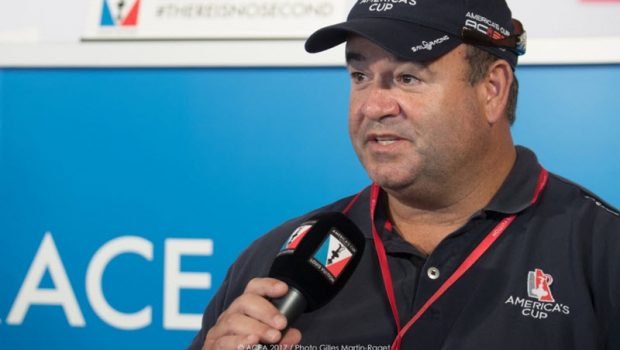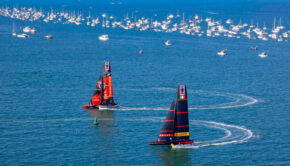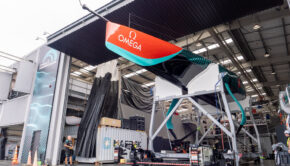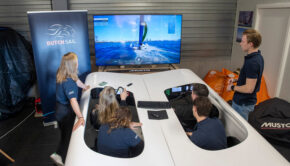America’s Cup: Umpiring under the spotlight
Published on June 15th, 2017
Richard Slater’s deep sailing knowledge, integrity and authority gifts him with the ideal armoury to deal with the intense pressure in his positions as the Vice Chairman of the Racing Rules Committee of World Sailing and as the Chief Umpire for the 35th America’s Cup, as appointed by the competitors.
But if Slater had his preference, he’d be more than happy to remain anonymous. Said Slater, “In an ideal world you wouldn’t know who we are.
“Racing should never be about the umpires and their decisions. It should be about the boats themselves and the excitement of the races,” suggested Slater who as part of the America’s Cup Race Management (ACRM) oversees the sporting and competitive rules of the America’s Cup.
“The teams can also play a big part in that, because we are only called into the spotlight when they break the rules, so they affect that.”
It is a view that has already been tested on multiple occasions on Bermuda’s Great Sound and most notably in a contentious Louis Vuitton America’s Cup Qualifiers Round Robin 1 race between Emirates Team New Zealand and Artemis Racing.
On that occasion, Slater, an Australian native and his multi-national team including Brad Dellenbaugh (USA-Umpire and Jury Chairman), Craig Mitchell (Great Britain-Umpire), Miguel Allen (Portugal-Umpire) and Alredo Ricci (Italy-Umpire) had just a few split moments to come to the decision to award Artemis Racing a dramatic final-mark penalty, handing Emirates Team New Zealand victory at the finish line.
“We have to almost have the decision before a penalty call is made so as soon as it does we have an immediate answer,” revealed Slater on the challenges the ACRM umpires face.
“The world of sailing we are in now, we have so many facts, our job is to prioritise the facts we need to look at and which facts we have to put aside.
“You have to turn off the other information and what you are seeing and hearing from the boats because each call is different.
“That’s the biggest change we have had, we now have to prioritise the data rather than go hunting for it.
“It is a massive management battle but we do our best to make what we feel is the right call quickly from all the facts we have and see what the most likely outcome should be.”
Just as in all sports, umpires are not infallible and even with the best sailing umpires in the world that are overseeing the 35th America’s Cup, Slater and his team had to later admit that their decision against Artemis Racing, on reflection, may have been different.
However, as seldom seen in many other major sports, Slater did not hide from the mistake, far from it, he instead stood in front of the glare of the world’s media and took full responsibility for the incident.
“Transparency is definitely important for what we do. We are happy to hold our hands up when we are wrong but also it is important for the teams to know that when we feel a decision is correct, we mean it and they have to respect that.
“In rugby for instance everything stops and a video umpire can make a call after watching a replay multiple times.
“We don’t have that because sailing doesn’t stop, particularly with these boats because they are so fast, if we hesitated to make a call, something else could have happened in the meantime.
“There is also nowhere for us to hide out there or afterwards with the media attention so it is always in our best interest to be transparent and is something we always pride ourselves on.
“That communication between us and the teams is crucial. Any rule changes are discussed with the teams and so it is important that everyone body understands what is going on and there are no misunderstandings.
“I don’t like being in front of the media and cameras but I am getting more and more used to it.”
America’s Cup Match (June 17 to 28; may end earlier): The final stage of the 35th America’s Cup will see Jimmy Spithill’s Oracle Team USA lining up against Peter Burling’s Emirates Team New Zealand, with the winner to be the first team to claim seven points. However, the caveat is how the Defender, which won the Qualifiers held on May 26-June 3, will begin the series with a one point advantage. As the rules detail, the Challenger will carry a one point disadvantage (ie, minus 1), meaning they will need to win eight races to take the trophy whereas the Defender need only win seven races.
Event details – Results – Facebook
Here are the answers to these questions…
• What is the racing schedule? Click here
• What is the competition format? Click here
• How can I watch the racing? Click here
Source: ACEA









 We’ll keep your information safe.
We’ll keep your information safe.